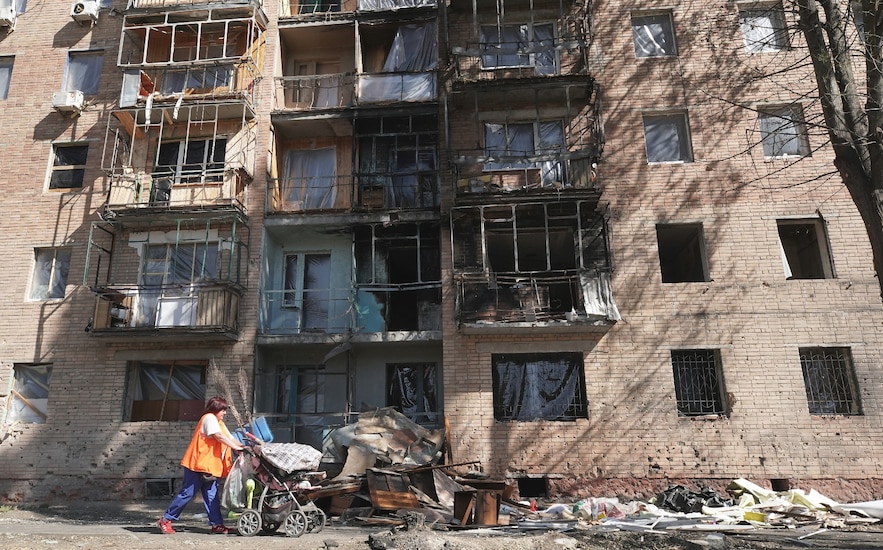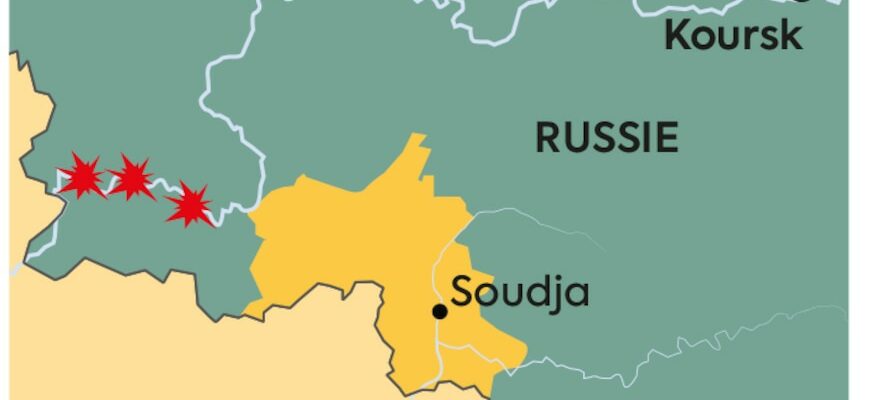Galina still remembers the invasion of Sudja, in the Russian oblast of Kursk, near the border with Ukraine. The first, in 1941, when German soldiers entered her room in the middle of the night. She was 6 years old. Eight decades later, on August 6, this retired doctor was at home in the same village of 5,000 people when she heard gunfire. “When you see what our people have done in Ukraine, you wonder who the real Nazis are,” she fumes. The electricity has disappeared, as has the telephone network. Galina does not know it yet, but this is the beginning of a new invasion, the first in Russia since the Second World War. In an incredible gamble, kyiv’s troops are bringing the conflict to Russian soil.
In the early months of the war, Ukraine had indeed carried out small assaults and regularly bombed Russian oil refineries and airfields with its homemade drones. kyiv had even successfully launched two small incursions into Russia, with groups of Russian exiles supported by the Ukrainian army. But on August 6, Ukrainian troops, which easily crossed the lightly defended border of the Kursk region, pushed dozens of kilometers into Russia. A breakthrough that changed the course of the war, after a gloomy year in which Ukraine tried, often in vain, to contain Russian advances on its eastern front. Russia wanted to “destroy us” but the war has “come home,” Ukrainian President Volodymyr Zelensky said in a video from the border area from where kyiv launched its assault. “Whoever wants to sow evil in our land will reap the fruits in his own territory. This is not a prophecy, nor a jubilation, nor a blind vengeance. It is only justice,” he added.
Galina, who was at the forefront of this raid, took refuge in her cellar. For days, she lived in the dark, losing track of time and eating canned food. Her son Oleg, 61, who lives with her, was in Moscow on a business trip. On August 8, he returned to Kursk and decided to go and get his mother by car. The Russians had already withdrawn, the Ukrainians had not yet held the city. On the way, the buzz of drones and the roar of explosions resonated constantly.
The Ukrainian offensive in Russia.
© / Legends Cartography
Stuck in the cellars
“When I arrived in the city, the road was already littered with anti-tank mines. A drone fired at my car, I was injured, I was starting to lose blood. I drove with flat tires to my mother’s house, who treated me,” says Oleg. On the spot, those who remained are terrified. “The authorities fled first with their families, there was no organized evacuation. Those who had a car left, the others remained stuck in the cellars,” he says.
But Oleg, a businessman with an American passport and whose family still lives in the United States, managed to get evacuated by Ukrainian soldiers to the city of Sumy, Ukraine, where L’Express met them in a refugee shelter in the area. He and his mother did not take kindly to the Russian invasion of Ukraine in February 2022. “We didn’t believe Russian propaganda: before the war, we had always lived without problems with the Ukrainians. If the Russians hadn’t attacked them, we wouldn’t be here,” recalls Galina – hardly representative of the inhabitants of her village – bursting into tears. “If someone had told me a year ago that Russians would come to take refuge with us because we had conquered their territory, I wouldn’t have believed you,” sighs a Ukrainian volunteer.
In Sumy, a city of 260,000 people surrounded by Russian troops in the spring of 2022, the traditional white cross has been replaced by triangles, symbols of this daring operation. Ukrainian tanks under camouflage nets, American armored vehicles and Russian tanks captured from the enemy: even in Donbass, it is rare to see so much military equipment. The Ukrainian soldiers themselves, met on the way to Suzha, cannot believe it. “We didn’t have time to think. Everything was very well organized, in total secrecy. Our commander only told us the day before that we were going to Russia,” says a soldier from an assault brigade, who is returning from a battle in the Kursk region. “It’s not the same as fighting in Ukraine. For this operation, we have something to shoot at. With more equipment, of better quality,” continues the fighter.
Three weeks after the incursion began, kyiv has conquered 1,263 square kilometers and 93 localities. A humiliation for Russia, unable to repel an attack on its own territory. Nearly 133,000 Russians have had to be evacuated, according to the authorities. Ukrainian troops have also destroyed several strategic bridges on the Seym River and have seized as much territory in one week as Russia has in Ukraine since the beginning of the year. Ukraine seeks to “destroy as much Russian war potential as possible”, but also to “create a buffer zone” against the bombing, Volodymyr Zelensky said.
Gliding bombs
In the Sumy region, most residents seem to support the operation. “The raid has reduced the number of enemy fires against us, because the front line has retreated. The Russians can no longer fire mortars,” says the mayor of Khotyn, a village on the border, Mykola Torianik. “But now they are more regularly sending gliding bombs, which do much more damage. If a bomb falls here, the whole street is destroyed.” “Our army is just doing its job,” sighs Olena, who left the neighboring village on a moped with her husband. “We just hope that this will help end the war more quickly.”
Although peace still seems far away, the Kursk operation has boosted the morale of both soldiers and society, which badly needed it. Many Russian soldiers have been taken prisoner, including conscripts positioned on the border. The latter now constitute a “bargaining chip”. On Saturday, August 24, Ukrainian Independence Day, Moscow and Kiev exchanged 230 prisoners of war, all conscripts, a first since August 6. Among the freed Ukrainians, many had been taken prisoner at the beginning of the Russian invasion, including 50 soldiers captured in Mariupol.
The operation proved to the West that Ukraine is still capable of regaining the initiative. The reaction of its allies was surprisingly positive: although generally careful not to cause an “escalation” with Moscow, Berlin and Washington indicated that they did not mind their weapons being used on Russian soil. The operation tarnishes the image of strength and control that Vladimir Putin seeks to impose. While he threatened to use “all means” possible to defend Russian citizens, a barely veiled nuclear threat, the Kremlin leader was content to launch an anti-terrorist operation and reprimand army officials on television.
While many Ukrainians had hoped that the territories taken from Moscow could be exchanged for occupied Ukrainian areas, this scenario seems unlikely. “Putin sees this situation only as an expansion of the war,” says Ukrainian analyst Vitaliy Portnikov, who adds that Ukrainian territorial gains are too small and not symbolic enough. “Giving up Donbass or Crimea would be politically very delicate, if not impossible for Putin,” adds Ilya Ponomarev, a former Russian MP who has taken refuge in Ukraine.

A resident walks past a building hit by Ukrainian strikes in Kursk, Russia, on August 16, 2024.
© / afp.com/TATYANA MAKEYEVA
This successful initiative still gives Kiev a more favorable position in potential negotiations with the Russians – for the moment non-existent since the failure of a first series of talks in spring 2022. The Ukrainian president says he wants to develop, by November, the date of the presidential election in the United States, a plan that would serve as the basis for a future peace summit, to which the Kremlin should be invited.
A snub for Putin
So far, Russian public opinion, fed on state media propaganda, does not seem to blame Vladimir Putin too much for the terrible snub recently inflicted by kyiv. “The Ukrainian incursion is too weak a ‘dose of poison’ to stop the ‘organism’ of the attacker. It is certainly a blow to the Kremlin’s reputation, but it is unlikely to provoke a significant rise in social or political discontent among the population, or to lead to a rebellion of the elites,” Russian political scientist Tatiana Stanovaya analyses on X. For the moment, it would seem that the Kremlin is content to let the situation fester on its own, the researcher adds. “This means that the Ukrainian presence in the Russian border regions could persist for months, if not years, and that the population could eventually get used to it.”
In the Kursk region, Ukraine finds itself in the delicate position of the occupying force. Militarily, pushing the incursion further could stretch supply lines and exhaust troops and resources. “The presence of its own soldiers in enemy territory certainly supports the morale of the Ukrainian population, but it is the number of equipment and military personnel on the front that will be decisive for the continuation of the war,” warns analyst Vitaliy Portnikov. kyiv had hoped that the Kremlin would divert its troops from Donbass, particularly to the Donetsk region. But for now, the Russians continue to gain ground, particularly towards the strategic logistics hub of Pokrovsk.
Water distribution
Ukraine will also have to find a way to deal with potentially hostile Russian civilians who remain under its control. About 19,300 of them remain in the border areas of Kursk Oblast, according to Russian authorities. Kiev’s newly created military administration in the region is just beginning an initial census of the population and its needs. In Sudzha, Ukrainian military personnel have begun distributing water, food, hygiene products and medicines.
“We don’t want to keep these lands, we don’t need them,” Oleksiy Dmytrashkivskyi, a spokesman for the military administration, told L’Express. The Ukrainian Ministry for the Reintegration of Occupied Territories, which is now in charge of the region, assures that Ukraine is ready to organize evacuation corridors to Russia. “So far, Russia, which should have taken care of its citizens, has not asked us to open such a corridor,” said Minister Iryna Vereshchuk, who warned that she will not accept Russians from the Kursk region of Ukraine. Oleg and Galina, who found refuge there in Ukraine, are particularly lucky.
.
